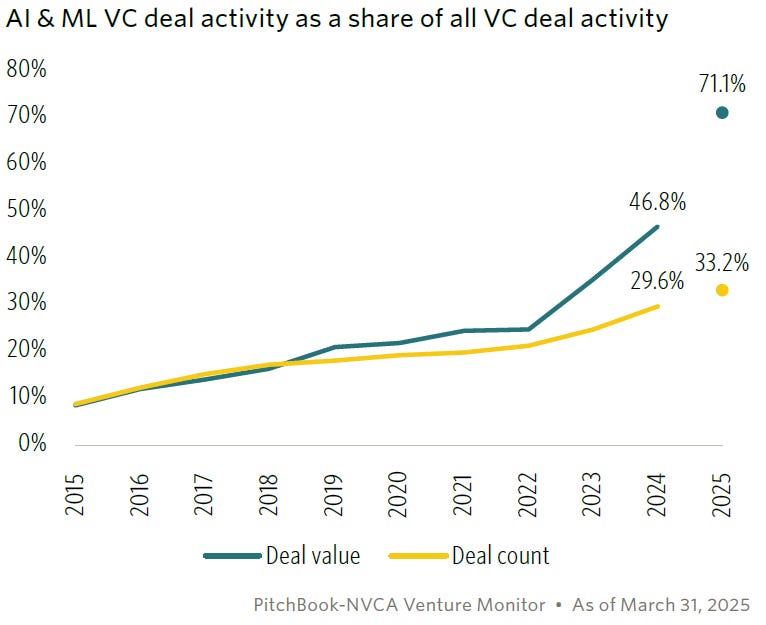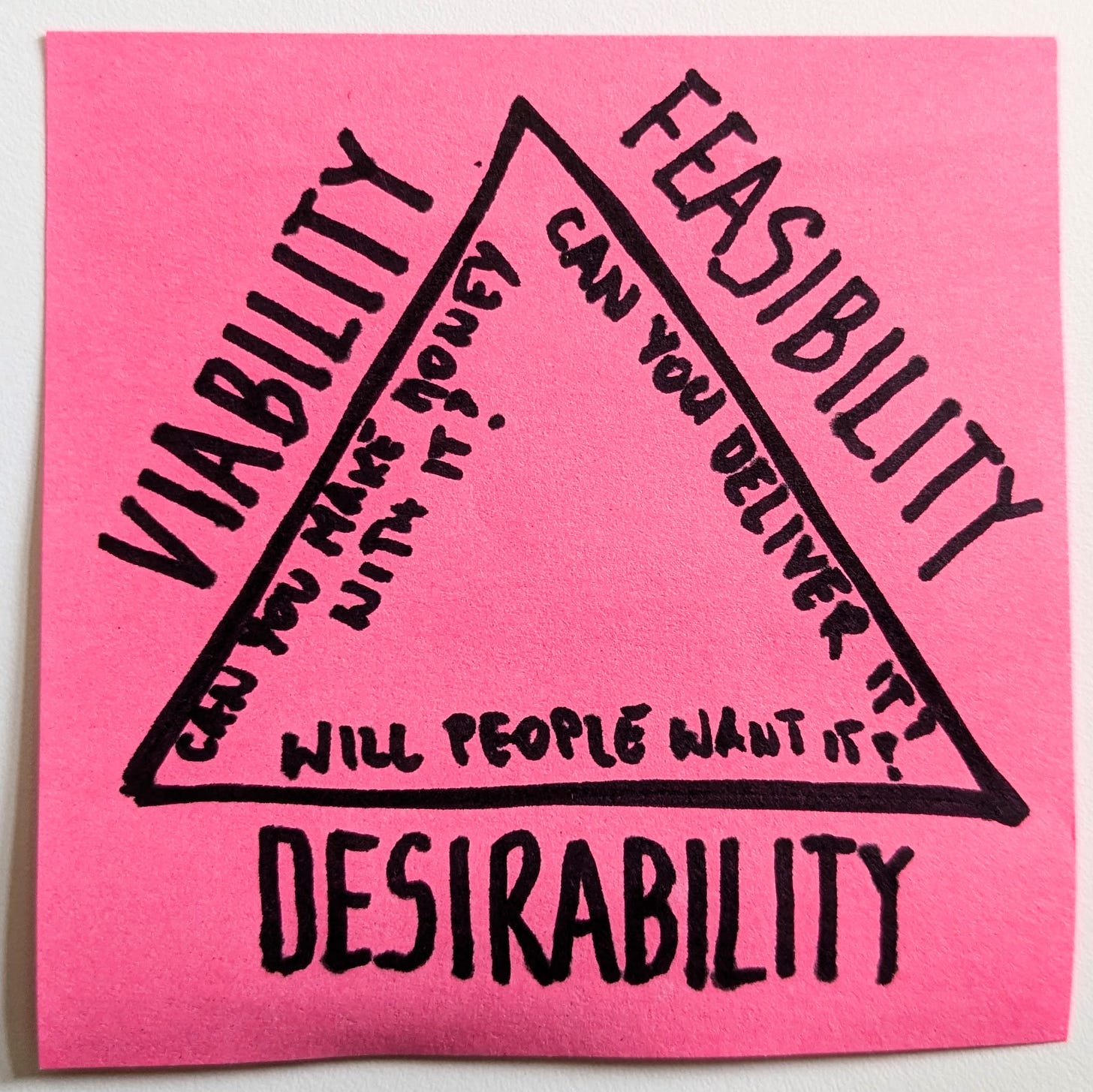Bootstrapping: The New Black?
The traditional VC model is increasingly exclusive, with AI startups dominating investor interest. This change will push many entrepreneurs to embrace bootstrapping.
"Prediction is very difficult, especially about the future."
Niels Bohr
I've been in the software business for 25 years. I've seen all its shifts, big and small, throughout that time. I tend to stay on the sidelines when people make bold claims about how the future will look.
The longer I am around, the more I'm happy to keep it to myself. Especially since we stay in our bubbles and overestimate the impact of whatever we're doing on, well, everything else.
Yet, some things rearrange the whole playing field. I don't risk much stating that for (digital) product development, AI is one of those things.
So, against my better judgment, let me make some predictions today.
The classic funding model (Pre-Seed, Seed, Series A/B/C, etc.) will become increasingly exclusive.
In many contexts, barriers to trying new ideas will be reduced.
If we add 2 and 2, we'll see the renaissance of bootstrapping.
The Pivotal Change Test
First of all, let's challenge the notion of whether AI is, in fact, such a game changer.
For the most part, in whatever we do, we stay in our echo chambers. While that obviously has a positive effect—we get positive reinforcement for whatever we do—it also distorts our perspectives.
We believe that our thing is way more important than it, in fact, is. After all, everyone around us understands the thing, and many treat it as crucial. And it just so happens that if you're reading this, you're likely within the same AI bubble.
Thus, I have a litmus test. It (whatever it is) becomes a thing only after the mass media start covering it with decent regularity. It means that the ripples of new technology affect societies, not just business niches.
Using that test, blockchain, even if hyped at its time, has never seemed like the pivotal change. Heck, explain blockchain to an average 50-year-old whose background is not in IT. Good luck with that!
Risking that I rub some folks the wrong way, Agile, as popular and obvious as it might seem in some circles, was not such a game changer either.
I wanted to suggest that the last such revolution to make the news was the Internet. But I realized I was wrong. The last one was the COVID-triggered popularity and acceptance of remote and hybrid work.
And yes, it's a bold claim to disregard such phenomena as smartphones or social media. It's a side discussion, which I'm happy to have, by the way, but largely irrelevant to the point I'm trying to make here.
Unquestioningly, AI has passed my litmus test of "making it to the news."
Put simply, because so many people outside our echo chamber—who understand diddly squat about AI models' inner workings—perceive this technology to be a game changer, it's meant to be so.
It's not just the overinflated egos of big leaders from big techs claiming yet another groundbreaking innovation. It’s the story that captured the interest of your next journalist, too. And that makes all the difference.
AI Repaints the Landscape
If a layperson sees a potential impact, we—the insiders—should see it in more color, right?
And we do.
The career vibe coding has made is one example. While it's hardly ready to reinvent product development, it can easily put my son's computer science teacher in awe.
Sure, we question whether the models can reason (and rightfully so).
We may consider whether the audacious claims made by leaders of AI companies will materialize (no, not really, at least not the picture they paint).
We raise a brow when CEOs of big techs boast about how much code their companies generate (while we should rather ask the engineers what their take is).
It's almost as if wherever we looked, there was another rabbit hole.
Since AI capabilities change the landscape so significantly, all bets are off. The uncertainty makes all claims possible, with an obvious bias toward hyping AI.
In such a situation, the bets would typically cluster around two extremes:
AI is THE future, and unless you jump on the bandwagon, you're going to face the Blockbuster moment.
AI doesn't know two shits and a half about the craft, and anyone who mindlessly applies it will be up for a rude awakening.
While one could argue that the truth is likely somewhere in between (I definitely would), that doesn't matter much. For better or worse, it's the most common perceptions that play a key role here.
Evolution of VC Landscape
Since popular perceptions are heavily skewed toward AI hype, we can expect investors to follow suit. And they don't disappoint.
YC, which VCs often mimic when fishing for trends, is increasingly betting on AI. They almost tripled the share of AI-related investments in their cohorts over the last two years. If it's as strong a signal as it typically is, we should already be seeing a market-wide shift in funding.
And we do.
If anything, it might even be an overreaction. While the percentage of funded AI startups rapidly grows, the sheer amount of funds thrown at them is borderline insane.
It's as if there were two different games.
Either you are an AI startup, and then it's easier to get funding, and you'd get more money.
Or you are not, and then it's much less likely to secure an investment, and if you beat the odds, you're going to get less.
Chris Neumann, in his recent summary of the startup funding landscape, writes:
“Founders building in [AI] spaces or who are able to convincingly argue why their company will benefit from the changing landscape are having more success fundraising than ever before.
But for founders of nice, incremental businesses. The type that solve a real problem and that very likely would have been able to raise VC funding 2 years ago, it’s a different story.”
We see the same narrative in the data.
And if that's not enough, you can breathe it at any startup event. It's ubiquitous.
I used to smile at aspiring founders claiming their idea was "AI-powered" when all it encompassed was a few smart if statements. After all, it's always been easy to artificially add an AI component and claim the whole product to be "new generation" or something equally inflated.
It's time to eat my own words. These days, AI is almost a prerequisite for securing funding.
The message of the day is: "If your product idea doesn't have AI in it, better go back to the drawing board and invent something that does."
Disillusioning? Yes.
True? Sadly, yes.
Ideation Has Never Been Easier
Fortunately, there’s good news, too.
As much as the advent of AI has reshaped the funding landscape, it has also given aspiring entrepreneurs an edge. The tools we have for rapid prototyping and validation are pure gold.
Well, at least compared to what we had before. However, I'm not suggesting that the tooling won't continue to improve over time.
At Lunar, we've been educating our clients to defer development and focus on low-tech experiments that generate feedback and validate their ideas before committing to the expensive part. Then, we would have fought an uphill battle to convince them to build less than they wanted.
Our goal has always been to confirm that the idea has its legs before anyone makes significant expenses. That hasn't changed at all with AI.
However, we suddenly have more tools.
AI models serve as a decent sounding board for the creative process of defining a product idea.
Tools such as Figma, v0, Replit, and Lovable allow the generation of clickable UX or even prototypes of web apps.
Suddenly, the bar to do the desk research is lower. And getting something to put in front of potential customers' eyeballs is more than affordable.
Sure, it doesn't mean we can generate a sustainable product that way. Not even close for now. However, we have many more options to explore when determining the viability, desirability, and feasibility of the idea.
The ideation has become much more feasible as a single-person effort. It’s a different game than it was a few years back.
Disclaimer: It’s not that I would advise doing ideation alone. There is tremendous value in getting help from competent veterans (and I mean people who are doing product development continuously, not those who are sitting in comfy seats of investors who haven’t run an actual startup for two decades). The new ideation capabilities, though, help everyone.
Prediction: Renaissance of Bootstrapping
We look at a landscape where it becomes increasingly difficult to secure funding for anything but a relatively narrow class of ideas. In fact, even if we discounted the AI hype, the demand-to-supply funding ratio remains a formidable challenge for pre-pre-seed startups.
On the other hand, the exact root cause, which is acting against founders in one place (AI), is tremendously helpful in another. It removes—or at least significantly lessens—some early product development obstacles.
It's as if one door was getting shut while another was opening.
Many product startups can go through their runways at a significantly lower pace, thus making bootstrapping a feasible option. Given the funding climate, for some (many?), the only feasible option.
Oh, and given how much we can lower the bar for trying out an idea, we should expect many more people to do just that. Not only do we reroute many startups to bootstrapping, but we'll see more aspiring entrepreneurs, too.
Admittedly, if you dream about another unicorn, that's not a viable path. But then, again, discounting the hype toward the unicorns, what are the chances of creating another billion-dollar company?
As much as these stories don't get a ton of publicity, there's no shortage of entrepreneurs dreaming of building more modest businesses.
Curiously enough, the transition may force a reinvention of the VC business, which triggered the change in the first place. If you ask me, it would be a welcome change. But let's worry about it once we get there.









